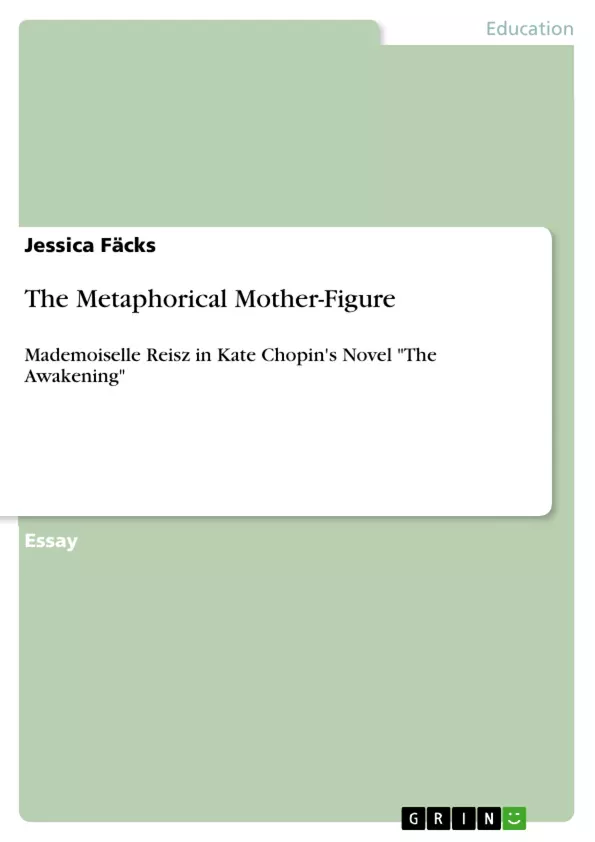Much has been written about Mademoiselle Reisz (in the following abbreviated with Reisz), the independent pianist in Kate Chopin’s novel The Awakening. Critics either interpreted her as Edna Pontellier’s “artistic role model” (Seidel, “Painting” 231) or as a “conjurer” (Giorcelli 137), who is “always dressed in black” (Giorcelli 136) and therefore portrays a vivid contrast to Edna’s feminine friend Adèle Ratignolle, who is “always dressed in white” (Giorcelli 136). Although Reisz is a secondary character, who only ap¬pears in five chapters (Ch. IX, XVI, XX, XXI, XXX), the author nevertheless offers another aspect of her. In the following, this paper will show that Edna attempts to compensate the loss of her mother by replacing her with a metaphorical mother-figure whom she finds in Reisz.
II. The Early Motherlessness of Edna Pontellier
In order to understand Edna’s motivation to find a mother-figure in Reisz, her child¬hood has to be reflected upon. Throughout the novel, the recipient is granted only little in¬formation about Edna’s deceased mother, who remains nameless. Joyce Dyer points out that “[i]t is interesting that Chopin treats Edna’s motherlessness so briefly and, appar¬ently, so casually. Edna’s avoidance of the issue suggests how painful it is” (91-92). Cristina Giorcelli goes further by stating that “[d]eprived of a mother, Edna could not fully be a daughter” (118). Thus, it is, from a psychological approach, deducible that the 28 year old protagonist lacks an important step in her identification process. As Edna confesses to Adèle, she feels like walking “idly, aimlessly, unthinking and unguided” (Chopin 38). The link between the lacking guidance and the absent mother is immediately set when the narrator continues to inform the recipient vaguely that Edna became a half-orphan when she was “quite young” (Chopin 38). Presumably, she is neither able to remember how old she was when her mother died nor is she able to recall any memories of her, either intentionally or unintentionally.
Inhaltsverzeichnis (Table of Contents)
- I. Introduction
- II. The Early Motherlessness of Edna Pontellier
- III. Mademoiselle Reisz - A Mother-Figure in Disguise
- IV. Conclusion
Zielsetzung und Themenschwerpunkte (Objectives and Key Themes)
This paper analyzes the role of Mademoiselle Reisz in Kate Chopin's novel The Awakening, arguing that Edna Pontellier finds a metaphorical mother figure in Reisz. The paper explores Edna's early motherlessness and its impact on her development, examining how Reisz fills the void left by Edna's absent mother.
- The significance of Edna's early motherlessness
- The portrayal of Mademoiselle Reisz as a mother figure
- Edna's emotional dependency on Reisz
- The complexities of their relationship
- The role of motherhood and female identity in the novel
Zusammenfassung der Kapitel (Chapter Summaries)
The introduction lays out the argument that Edna finds a metaphorical mother figure in Reisz. It highlights the existing interpretations of Reisz as an artistic role model or a “conjurer” and introduces the paper's focus on her as a mother figure for Edna.
The second chapter examines Edna's early motherlessness and its psychological impact on her. It explores how her lack of a mother figure influences her identity and her sense of direction. This chapter analyzes Edna's childhood experiences, her memories of her mother, and the consequences of her mother's absence.
The third chapter delves into the relationship between Edna and Reisz, analyzing how Reisz's actions and behavior portray her as a mother figure for Edna. It focuses on specific moments in the novel where Reisz exhibits maternal qualities, such as her touch of Edna's shoulder and her supportive gestures.
Schlüsselwörter (Keywords)
This paper focuses on the themes of motherhood, female identity, motherlessness, and artistic expression in the context of Kate Chopin's The Awakening. It explores the complex relationship between Edna Pontellier and Mademoiselle Reisz, highlighting the metaphorical mother-figure role Reisz plays in Edna's life. Key terms include maternal absence, artistic role models, female friendship, and the complexities of female agency in a patriarchal society.
Frequently Asked Questions
Who is Mademoiselle Reisz in "The Awakening"?
She is an independent pianist and a secondary character who serves as an artistic role model and a metaphorical mother-figure for the protagonist, Edna Pontellier.
How does Edna's motherlessness affect her character?
Having lost her mother at a young age, Edna lacks a maternal guide, which contributes to her feeling of being "unguided" and her struggle with female identity.
Why does Edna see Reisz as a mother-figure?
Edna attempts to compensate for her childhood loss by seeking emotional support and guidance from Reisz, who contrasts with the traditional "mother-woman" Adèle Ratignolle.
What is the contrast between Adèle Ratignolle and Mademoiselle Reisz?
Adèle represents the Victorian ideal of the "mother-woman" (often dressed in white), while Reisz represents the independent, childless artist (often dressed in black).
Is Mademoiselle Reisz a positive role model for Edna?
While she inspires Edna's artistic awakening, her isolation and lack of social integration also highlight the difficulties for independent women in that era.
- Quote paper
- Jessica Fäcks (Author), 2012, The Metaphorical Mother-Figure, Munich, GRIN Verlag, https://www.grin.com/document/188746



